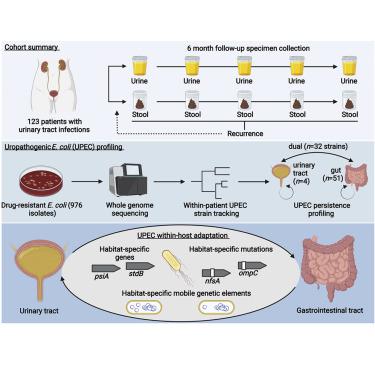Cell Host & Microbe ( IF 30.3 ) Pub Date : 2022-05-10 , DOI: 10.1016/j.chom.2022.04.008 Robert Thänert 1 , JooHee Choi 2 , Kimberly A Reske 3 , Tiffany Hink 3 , Anna Thänert 2 , Meghan A Wallace 3 , Bin Wang 1 , Sondra Seiler 3 , Candice Cass 3 , Margaret H Bost 3 , Emily L Struttmann 3 , Zainab Hassan Iqbal 3 , Steven R Sax 3 , Victoria J Fraser 3 , Arthur W Baker 4 , Katherine R Foy 4 , Brett Williams 5 , Ben Xu 5 , Pam Capocci-Tolomeo 6 , Ebbing Lautenbach 7 , Carey-Ann D Burnham 8 , Erik R Dubberke 3 , Jennie H Kwon 3 , Gautam Dantas 9 ,

|
Large-scale genomic studies have identified within-host adaptation as a hallmark of bacterial infections. However, the impact of physiological, metabolic, and immunological differences between distinct niches on the pathoadaptation of opportunistic pathogens remains elusive. Here, we profile the within-host adaptation and evolutionary trajectories of 976 isolates representing 119 lineages of uropathogenic Escherichia coli (UPEC) sampled longitudinally from both the gastrointestinal and urinary tracts of 123 patients with urinary tract infections. We show that lineages persisting in both niches within a patient exhibit increased allelic diversity. Habitat-specific selection results in niche-specific adaptive mutations and genes, putatively mediating fitness in either environment. Within-lineage inter-habitat genomic plasticity mediated by mobile genetic elements (MGEs) provides the opportunistic pathogen with a mechanism to adapt to the physiological conditions of either habitat, and reduced MGE richness is associated with recurrence in gut-adapted UPEC lineages. Collectively, our results establish niche-specific adaptation as a driver of UPEC within-host evolution.
中文翻译:

持久的尿路致病性大肠杆菌谱系显示出由移动遗传元件介导的生态位特异性宿主内适应的特征
大规模基因组研究已确定宿主内适应是细菌感染的标志。然而,不同生态位之间的生理、代谢和免疫学差异对机会病原体的病理适应的影响仍然难以捉摸。在这里,我们分析了代表 119 个泌尿道致病性大肠杆菌(UPEC)谱系的 976 个分离株的宿主内适应和进化轨迹,这些分离株是从 123 名尿路感染患者的胃肠道和泌尿道纵向采样的。我们表明,患者体内两个生态位中持续存在的谱系表现出增加的等位基因多样性。特定栖息地的选择会导致特定生态位的适应性突变和基因,从而可能调节任一环境的适应性。由移动遗传元件(MGE)介导的谱系内栖息地间基因组可塑性为机会性病原体提供了适应任一栖息地生理条件的机制,并且MGE丰富度的降低与肠道适应的UPEC谱系的复发相关。总的来说,我们的结果将利基特异性适应确定为 UPEC 宿主内进化的驱动力。



























 京公网安备 11010802027423号
京公网安备 11010802027423号